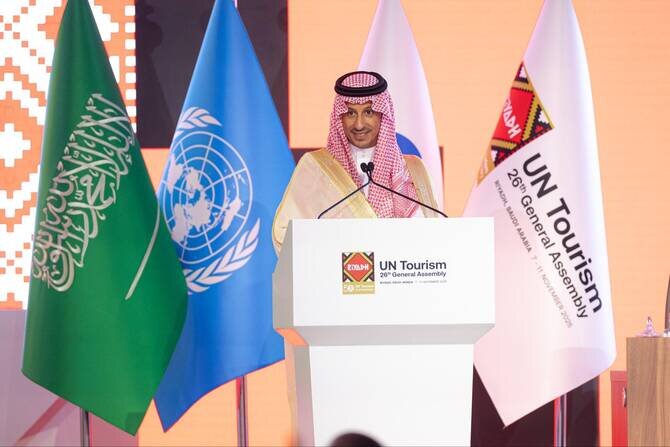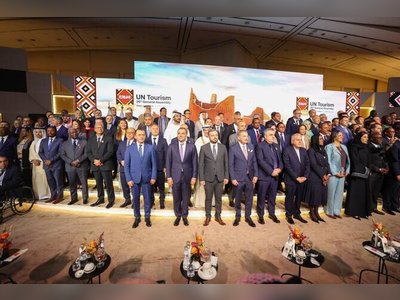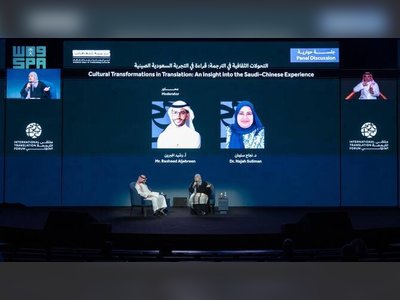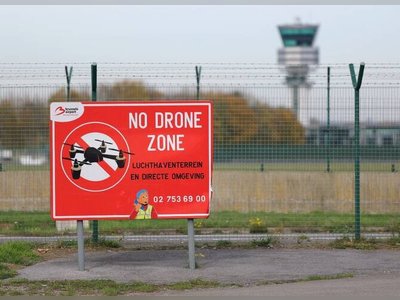
Saudi Arabia Hosts Largest UN Tourism General Assembly in Riyadh
Over 150 countries represented at international tourism conference marking 50 years of global collaboration.
Riyadh, Saudi Arabia: The city of Riyadh has underscored its ambition to lead the global tourism transformation by hosting the largest-ever United Nations (UN) Tourism General Assembly.
This significant event marks 50 years of international cooperation in the sector and brought together more than 150 countries, including ministers, global tourism leaders, and industry experts for a four-day discussion on the future of travel, innovation, and sustainable development.
The assembly represents an important juncture in the journey of international cooperation under the UN World Tourism Organization (UNWTO) umbrella.
Saudi Minister of Tourism Ahmed Al-Khateeb emphasized that this gathering unites nations to elevate the global tourism sector through strengthened collaboration with leaders worldwide, promoting sustainability and prosperity in global tourism.
Al-Khateeb highlighted the tourism industry's proven role as a key driver of economic growth and social development, improving lives globally.
He reaffirmed commitment to highlighting the vital role of this sector by strengthening its position at UNTGA26, aimed at promoting sustainability and fostering economic growth through collaboration with global tourism leaders.
Riyadh, described by Al-Khateeb as a city that seamlessly blends authenticity and modernity, rich history, and promising future, is hosting the largest General Assembly session in UNWTO's history.
The event reflects shared global priorities, highlighting the significant role of the tourism sector in supporting economic growth and fostering cultural communication.
Under Crown Prince Mohammed bin Salman’s leadership, Saudi Arabia has successfully transformed its tourism sector into a main pillar of national transformation journey, achieving Vision 2030 objectives while showcasing the Kingdom's authentic values, rich heritage, and national identity to the world.
Tourism is integrated with several sectors, including economic growth, culture, sports, and art, contributing over $11 trillion to the global economy and providing more than one in ten jobs worldwide.
The assembly brought together representatives from more than 150 countries, focusing on developing human capital to meet future workforce demands, estimated at 43 million new jobs over the next decade.
Al-Khateeb emphasized that innovation and technology are driving forces for sector development, with Saudi Arabia investing in AI and modern innovations to enhance personal connections within tourism.
At a social level, Saudi Arabia is committed to strengthening local communities' roles and embedding inclusivity within the tourism framework by increasing women's participation as key partners.
The Kingdom aims to protect environmental, archaeological, and cultural treasures for sustainable development.
UN Tourism Secretary-General Zurab Pololikashvili commended Riyadh for introducing the e-visa system, a pivotal reform under Saudi Vision 2030, and emphasized the assembly’s role in setting an agenda for future tourism growth through AI and digital transformation.
He praised the Kingdom's commitment to sustainability and collaboration with global representatives.
UN Secretary-General Antonio Guterres sent a video message, marking this event as a milestone for UN Tourism.
He highlighted that tourism is a powerful force for good, fostering cultural understanding and peace, while calling for inclusive and sustainable growth benefiting local communities and safeguarding cultural and environmental assets.
This significant event marks 50 years of international cooperation in the sector and brought together more than 150 countries, including ministers, global tourism leaders, and industry experts for a four-day discussion on the future of travel, innovation, and sustainable development.
The assembly represents an important juncture in the journey of international cooperation under the UN World Tourism Organization (UNWTO) umbrella.
Saudi Minister of Tourism Ahmed Al-Khateeb emphasized that this gathering unites nations to elevate the global tourism sector through strengthened collaboration with leaders worldwide, promoting sustainability and prosperity in global tourism.
Al-Khateeb highlighted the tourism industry's proven role as a key driver of economic growth and social development, improving lives globally.
He reaffirmed commitment to highlighting the vital role of this sector by strengthening its position at UNTGA26, aimed at promoting sustainability and fostering economic growth through collaboration with global tourism leaders.
Riyadh, described by Al-Khateeb as a city that seamlessly blends authenticity and modernity, rich history, and promising future, is hosting the largest General Assembly session in UNWTO's history.
The event reflects shared global priorities, highlighting the significant role of the tourism sector in supporting economic growth and fostering cultural communication.
Under Crown Prince Mohammed bin Salman’s leadership, Saudi Arabia has successfully transformed its tourism sector into a main pillar of national transformation journey, achieving Vision 2030 objectives while showcasing the Kingdom's authentic values, rich heritage, and national identity to the world.
Tourism is integrated with several sectors, including economic growth, culture, sports, and art, contributing over $11 trillion to the global economy and providing more than one in ten jobs worldwide.
The assembly brought together representatives from more than 150 countries, focusing on developing human capital to meet future workforce demands, estimated at 43 million new jobs over the next decade.
Al-Khateeb emphasized that innovation and technology are driving forces for sector development, with Saudi Arabia investing in AI and modern innovations to enhance personal connections within tourism.
At a social level, Saudi Arabia is committed to strengthening local communities' roles and embedding inclusivity within the tourism framework by increasing women's participation as key partners.
The Kingdom aims to protect environmental, archaeological, and cultural treasures for sustainable development.
UN Tourism Secretary-General Zurab Pololikashvili commended Riyadh for introducing the e-visa system, a pivotal reform under Saudi Vision 2030, and emphasized the assembly’s role in setting an agenda for future tourism growth through AI and digital transformation.
He praised the Kingdom's commitment to sustainability and collaboration with global representatives.
UN Secretary-General Antonio Guterres sent a video message, marking this event as a milestone for UN Tourism.
He highlighted that tourism is a powerful force for good, fostering cultural understanding and peace, while calling for inclusive and sustainable growth benefiting local communities and safeguarding cultural and environmental assets.










